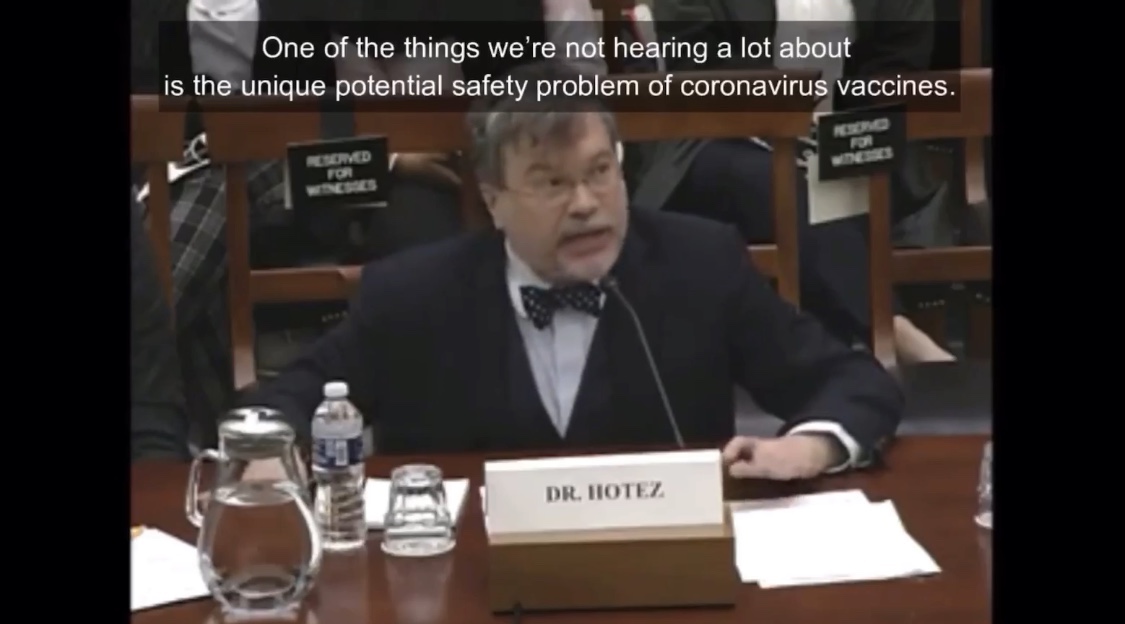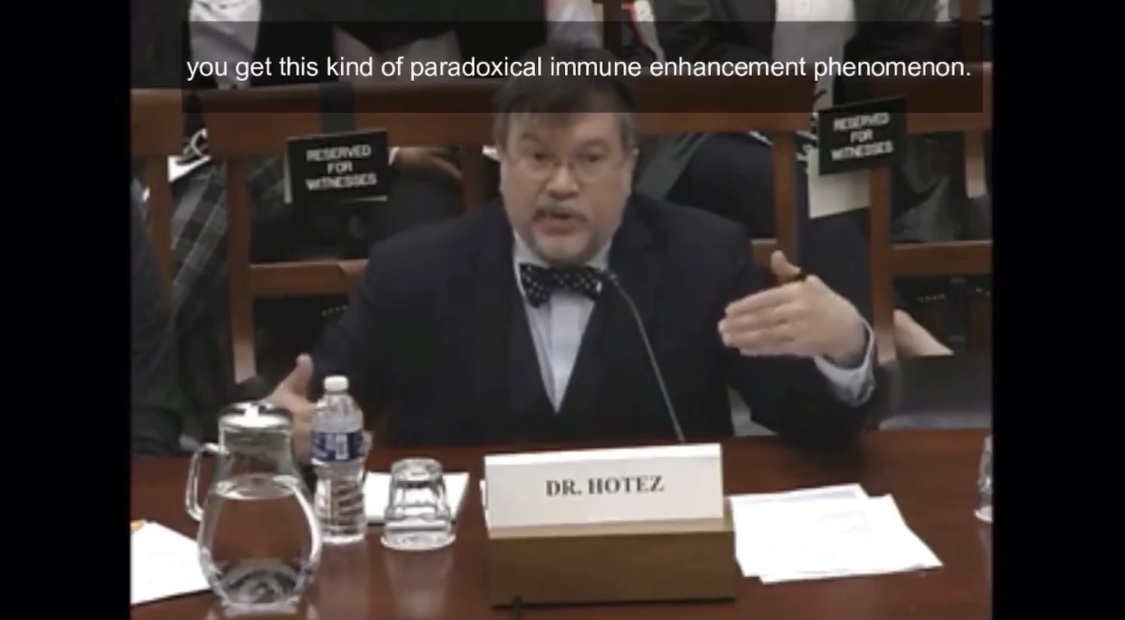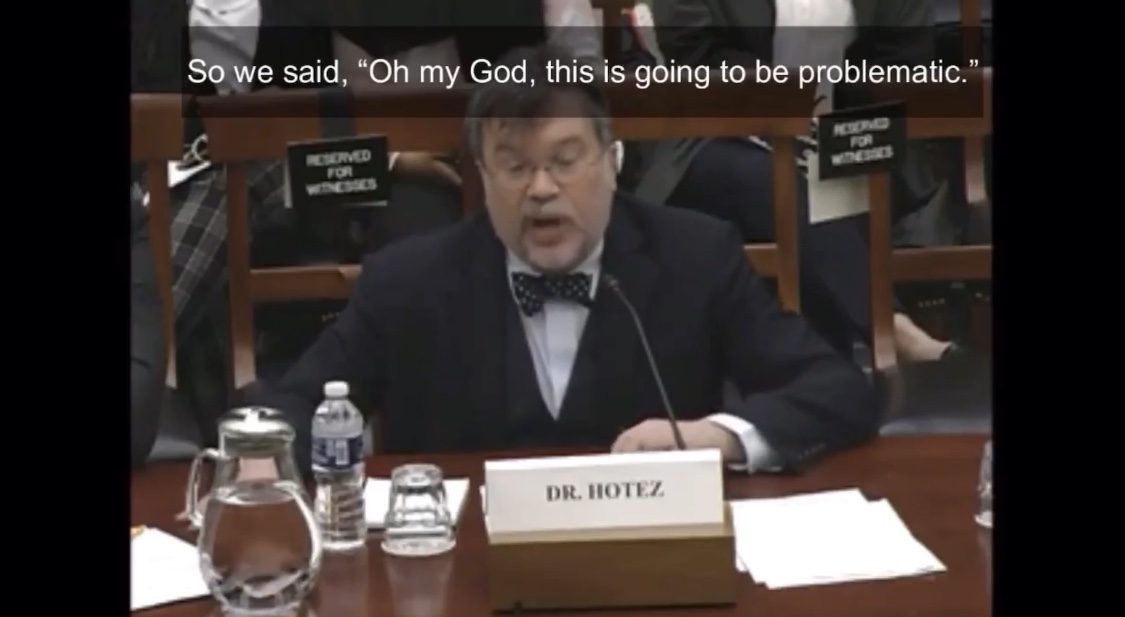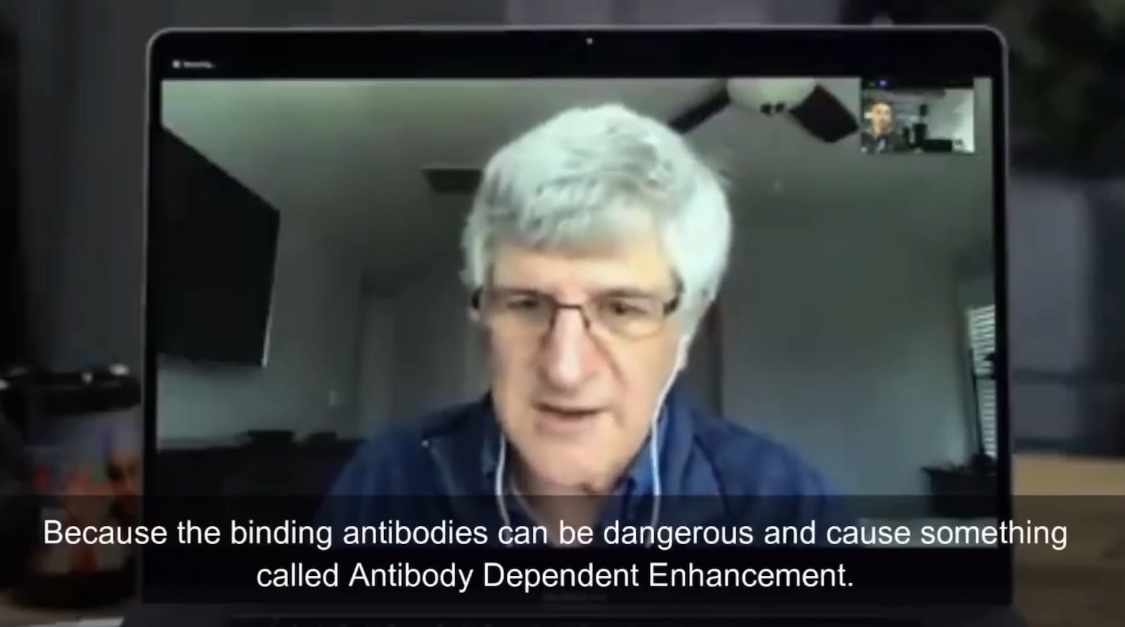Scientists have been trying to make coronavirus vaccines for decades and have not been successful. Previous SARS-CoV vaccines that they initially thought were successful because of the robust antibody production, turned out to make the disease worse when subjects were challenged by infection.
So let’s look at antibodies.
There are neutralizing antibodies and binding antibodies (aka, non-neutralizing antibodies). We want neutralizing antibodies but not the binding antibodies. Binding antibodies do not “neutralize” the virus when they bind, and rather, their presence indicates a potential problem.
Previous coronavirus vaccine candidates (for example, for SARS-CoV), caused the production of higher levels of binding antibodies which caused disease enhancement which in turn actually killed test subjects (animals) who received the vaccines. This is called “Antibody-dependent enhancement”.
From the article: https://www.nature.com/articles/d41587-020-00016-w
“Concerns persist that COVID-19 vaccines could cause antibody-dependent enhancement, which can potentiate viral entry into host cells and worsen disease.”
Most people don’t know this. Most people have never heard of this. Maybe the big media networks don’t find this important to share with the public, or maybe it’s just plain censorship. It’s probably censorship.
Regardless, this is what Dr. Peter Hotez (scientist, vaccinology) and Dr. Paul Offit (co-creator of the rotavirus vaccine) both stated earlier this year, regarding the development of a SARS-CoV-2 vaccine. They expressed concern that no coronavirus vaccine has ever been successful because of this very issue. (Both of these doctors are very pro-vaccine and can often be found invalidating the real risks of vaccines and reality of widespread vaccine injury.)




WATCH: https://www.instagram.com/tv/B-1-7gqHV8m/?igshid=gi9nltd7z4mz
—————————————
Let’s also take a look at an article published in September 2020:
From Marc Hellerstein, professor of nutritional sciences and toxicology of the University of California, Berkeley:
“…antibodies are not the primary protective response to infection by coronaviruses, the family of viruses that includes SARS-CoV-2. Indeed, high antibody levels to these viruses are associated with worse disease symptoms…”
“The most worrisome part, he said, is that antibodies also can make subsequent infections worse, creating so-called antibody-dependent enhancement. Two vaccines — one against a coronavirus in cats and another against dengue, a flavivirus that affects humans — had to be withdrawn because the antibodies they induced caused potentially fatal reactions.”
……Yikes.
While current vaccines being developed have been touted in the news as successful (giving the CEOs a chance to sell high while they can – Moderna / Pfizer), their “success” is based on antibody production… not on challenging the test subjects/participants with the virus to see if there is successful protection from, or enhancement of disease.
They don’t require those kinds of real-world tests (maybe it’s just “too risky”, as a former Chief Medical Officer from Merck states in this article), regardless of the potential for antibody-dependent enhancement (though it looks like the U.K. might attempt this soon):
https://www.vox.com/future-perfect/2020/11/17/21540773/covid-19-vaccine-human-challenge-trial-ethics
BUT, maybe they’ve addressed the antibody issue and there’s no need to worry, because it’s all been taken care of…? Hopefully?
Well, according to a study published this month, in November 2020: https://www.sciencedirect.com/science/article/pii/S1201971220307311
“…the detailed mechanism of ADE [antibody-dependent enhancement] and how to resolve this in coronavirus infections is not yet totally clear. From previous research on ADE in other coronaviruses, in particular SARS-CoV and MERS-CoV, it appears that the existence of ADE will elicit more severe body injury… This may affect the results of vaccine therapy.
The presence of this phenomenon in these two coronaviruses indicates a potential risk in the vaccine therapy for the novel coronavirus SARS-CoV-2, as it shares the same viral receptor and similar genome sequence with SARS-CoV. SARS-CoV-2 may have a similar mechanism of viral entry and thus may share similar mechanisms of ADE. This novel coronavirus has not long been known, so studies in this field have not yet led to any conclusions.” [Emphasis mine.]
That… doesn’t exactly give us much confidence.
And the vaccines are coming. Soon.
So, I have questions: Why isn’t anyone talking about this? Where is the news media on this subject? Why did I have to use “DuckDuckGo” to find these sources..? Is no one concerned about the potential for disease enhancement and turning this current virus into a very real problem for the masses who are not currently at risk?
I hate to say that I’m pretty sure I already know the answer.
We’re not supposed to know about this.
Because when no one knows about this, the fallout can be spun in whatever direction is preferable.
————————————
When the vaccine is distributed and millions of people choose to receive it, will it prime the immune system for an enhanced infection, causing more severe symptoms, when these individuals eventually contract it?
There’s literally no reason to believe it won’t do this. Pharmaceutical companies aren’t exactly full of integrity, and they have NO LIABILITY for what their vaccines will do to people.
Will we hear about this being linked to the vaccine?
Doubtful.
Who wants to bet it will be called a “new strain”.
C0VlD-21..?
(Aside from the flu-like symptoms and other adverse events that the vaccines themselves will directly cause.)
Be careful out there and pay attention. This might turn out to be what Bill Gates meant as “the next one”:
———————
Additional sources:
Previous attempts at coronavirus vaccines:
https://www.nature.com/articles/s41564-020-00789-5
“Safety concerns for SARS-CoV-2 vaccines were initially fuelled by mouse studies that showed enhanced immunopathology, or ERD [enhanced respiratory disease], in animals vaccinated with SARS-CoV following viral challenge (55,56,57,58).”
55: https://pubmed.ncbi.nlm.nih.gov/22536382/
“These SARS-CoV vaccines all induced antibody and protection against infection with SARS-CoV. However, challenge of mice given any of the vaccines led to occurrence of Th2-type immunopathology suggesting hypersensitivity to SARS-CoV components was induced. Caution in proceeding to application of a SARS-CoV vaccine in humans is indicated.”
56: https://pubmed.ncbi.nlm.nih.gov/17194199/
“… vaccines not only failed to protect from homologous or heterologous challenge, but resulted in enhanced immunopathology with eosinophilic infiltrates within the lungs of SARS-CoV-challenged mice.”
57: https://pubmed.ncbi.nlm.nih.gov/21937658/
“A double-inactivated severe acute respiratory syndrome coronavirus vaccine provides incomplete protection in mice and induces increased eosinophilic proinflammatory pulmonary response upon challenge.”
58: https://pubmed.ncbi.nlm.nih.gov/18941225/
“Prior immunization with severe acute respiratory syndrome (SARS)-associated coronavirus (SARS-CoV) nucleocapsid protein causes severe pneumonia in mice infected with SARS-CoV”